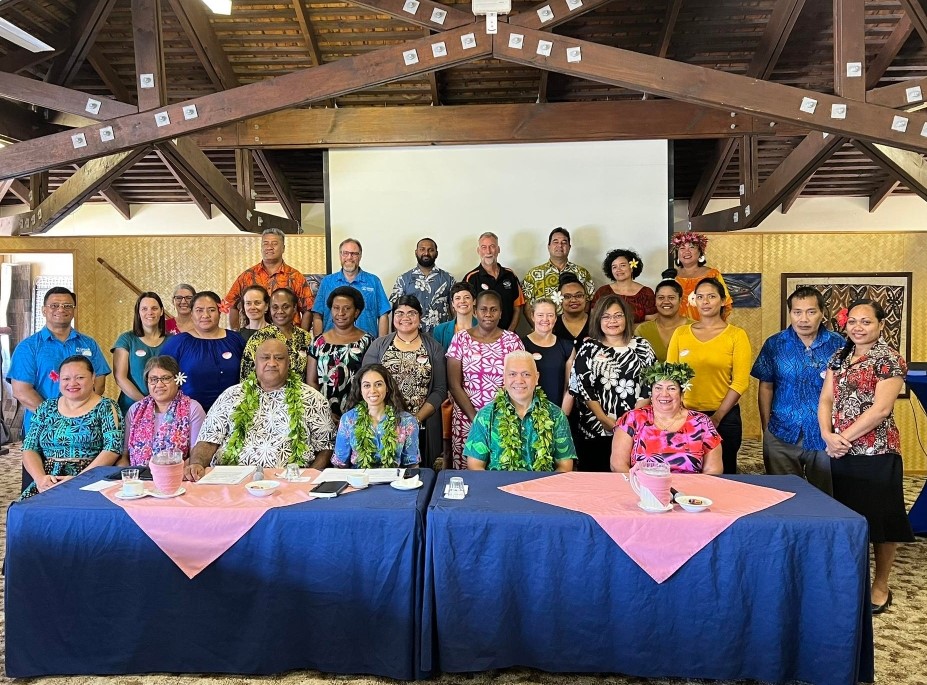Cook Islands joins High Ambition Coalition to end plastic pollution
Monday 1 May 2023 | Written by Supplied | Published in Environment, National

The Pacific region met last week for the two-day (24-25 April) Pacific Regional Preparatory Workshop convened by the Secretariat of the Pacific Environment Programme (SPREP) to form their “strategy for a united way forward”. Picture: SPREP/23042633
“We have joined the High Ambition Coalition to end plastic pollution. This coalition sets an ambitious target to reverse and end plastic pollution by 2040,” says National Environment Service (NES) director Halatoa Fua.
Fua spoke at the Pacific Regional Preparatory Workshop last week convened by the Secretariat of the Pacific Environment Programme (SPREP) with funding support from the Government of Australia and the Capacity Building Related to Multilateral Environmental Agreements (MEAs) in African, Caribbean and Pacific (ACP) Countries – Phase III.
The Cook Islands fully supports a legally binding instrument to end plastic pollution that protects the environment and human health from the impacts of plastic across its full life cycle, and to attain a safe circular economy for plastics.
“We must be bold in our efforts to challenge the status quo and halt plastic pollution as a significant planetary crisis that impacts our ecosystems, biodiversity, the climate and human health,” Fua said.
The first INC was held in Uruguay in November 2022, with the second (INC2) to take place in Paris France in May. During the two-day meeting in the Cook Islands, the Pacific Islands representatives met to form their strategy for a united way forward.
“The road to INC2 and beyond is an easy one if we stand together as a strong region, with our voices as loud as our oceans,” said Fua.
“We call for a treaty that is firmly rooted in a human rights-based approach and our research is supported by science, and one that honours the waste hierarchy and precautionary principles.”
Meanwhile, “Saying No to single-use plastics” is not enough, much more must be done by our global community to address the plastic crisis we now face. And in recognising this, the United Nations Environment Assembly passed a resolution in February 2022 to develop a legally binding instrument to end plastic pollution including that within our marine environment. This must be completed by the end of 2024 across five official International Negotiating Committee’s (INCs).
Since the 1950’s the world has generated nine billion tonnes of plastic, for which only nine percent has been recycled. Over eight million tonnes of plastic enter the ocean each year with 40 per cent of the ocean’s surface covered in plastic debris. If our plastic consumption and behaviour continues, scientists warn that there will be more plastic than fish in the ocean by 2050.
Since 2012, the Cook Islands has had a “Single Use Plastics” regulation in place to guide their fight against plastic pollution, coupled with promotion of the Reuse, Reduce and Recycle values. As the world moves towards a new global treaty the Cook Islands is accelerating efforts to combat plastic pollution in all phases of production, use and legacy.
The Cook Islands aims to pass a new Solid and Hazardous Waste Bill this year which will include a new schedule of banned plastic items including plastic straws, polystyrene containers, single serve butter and spreads as well as products containing microbeads. This new bill will also introduce an advanced disposable recovery fee.
The island nation has also applied for its funding under the Eight Round of Funding under the Global Environment Facility System for Transparent Allocation of Resources (GEF8 STAR) to focus on Circular Solutions to Plastic Pollution Integration Programme. This has been recommended to the GEF Council for review and approval.
“We will receive US$3 million and are the only Pacific Island and one of two Small Islands Developing States Countries recommended,” said Fua.
“This programme will demonstrate and scale upstream and midstream, with an enabling environment to eliminate single use plastic products and packaging, enable circular design of materials and products, and ensure circulation of materials and products in practice through reuse and refill systems.”
The Pacific Regional Preparatory Workshop was attended by representatives from Australia, the Cook Islands, Federated States of Micronesia, Kiribati, Nauru, New Zealand, Palau, Papua New Guinea, Republic of the Marshall Islands, Samoa, Solomon Islands, Tuvalu, and Vanuatu.
- SPREP










































